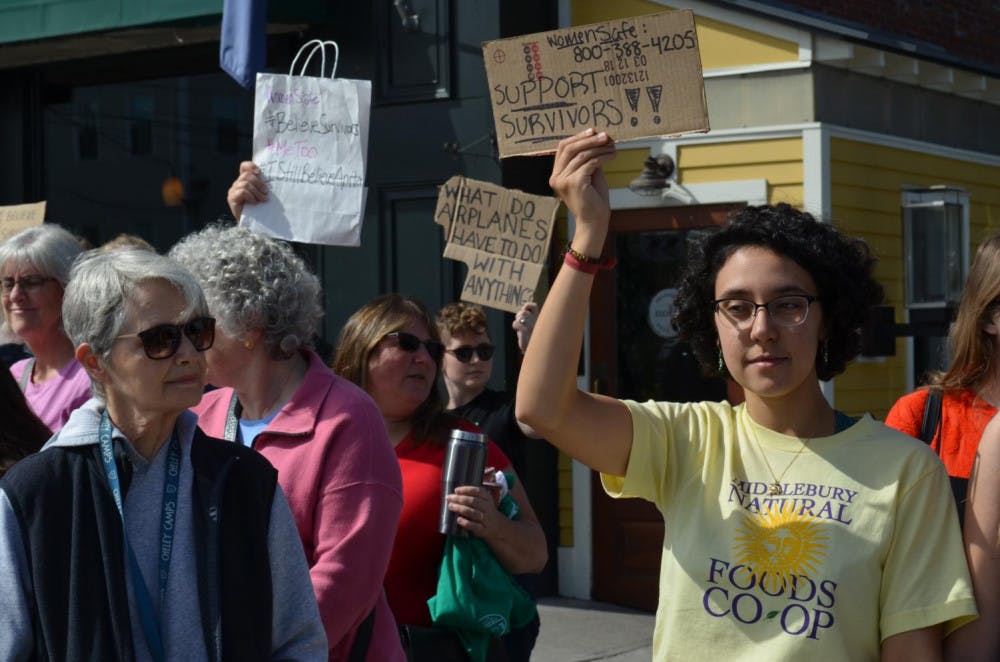As Dr. Christine Blasey Ford testified against Supreme Court Nominee Brett Kavanaugh early Thursday afternoon, dozens of students, professors and Middlebury residents gathered across the street from Shafer’s Market as part of a cross-country display of support for the California professor.
The demonstrators congregated around noon, many of them carrying signs bearing the hashtag #BelieveChristine and the words “I Believe” — slogans of a protest movement organized by and for survivors of sexual assault that took hold across the nation in the days leading up to Ford’s testimony.
“It felt like a really important moment of solidarity,” said Sophie Taylor ’20, who participated in the demonstration. “If just one of the women who shared their experience with sexual assault got something out of being able to share it in a space that they felt safe, then I think it was really successful.”
College professors Tara Affolter, Laurie Essig and Marion Wells organized the demonstration through the Women’s March online forum, which people across the country used to plan similar events.
Affolter and Essig gave opening statements as demonstrators gathered and invited survivors of sexual assault to share their experiences. After two women had told their stories, the demonstrators walked to the roundabout in the downtown where they joined others across the country in a minute of silence at 12:30 p.m.
Thursday’s demonstrations were the culmination of weeks of national anticipation that led up to Thursday’s hearings.
[gallery ids="40213,40215,40216,40217"]
Ford said on Sept. 16 that she would testify publicly to the Senate Judiciary Committee about the sexual assault she alleged Kavanaugh committed against her at a high school house party in Maryland in 1982.
Then on Sept. 23, The New Yorker broke the story of Deborah Ramirez, who accused Kavanaugh of assaulting her when they were students at Yale. Conversations about male privilege, drinking culture on college campuses and systemic challenges faced by accusers in Ford’s position dominated national news cycles approaching Thursday morning.
At the Middlebury demonstration, the emotion that drove people across the country to demonstrate was palpable.
“The pain that so many people are feeling in this moment is two-fold….[we are experiencing this] as survivors of sexual assault but also as [people] living in a state where our bodily integrity is not of the state’s concern,” Essig said. “Hopefully these gatherings around the country reminded survivors and women that we do matter even when that is not recognized by our representatives.”
Others said that raw frustration with a political establishment that seems to be overlooking Kavanaugh’s past drove them to join the demonstration.
“The absurdity of this spectacle that we’re seeing is the first thing that brought me out here today,” Affolter said. “The notion that someone is entitled to one of the highest positions of power in our country, and the idea that what that person has done in the past doesn’t matter, that’s absurd.”
Conversations also turned towards parallels between the party culture described from Kavanaugh’s high school and college years, and student life at Middlebury today. Though close to 30 years have elapsed since the incident Ford described last Thursday, Middlebury’s community can still learn from those parallels, Affolter said.
“In so many cases these accusations are explained away as if ‘that was college and I was drunk and I was young,’” Affolter said. “I think that institutions like Middlebury or any undergraduate institution really have to ask ourselves, how are we preparing and supporting young people to be responsible for their actions?”
Most of the demonstrators who gathered Thursday were college students, but town residents joined the event as well. Community members have joined forces with college protesters in the past, like in March when hundreds of Middlebury Union High School students joined college students and professors in a walkout for increased gun control after the Parkland shooting.
[pullquote speaker="Sophie Taylor ’20" photo="" align="center" background="on" border="all" shadow="on"]I think that the power in numbers and silent support and connection with one another was palpable.[/pullquote]
According to Affolter, it was important to her and the other organizers that Thursday’s demonstration be accessible to the town as well as the college community.
Joanna Colwell, owner of Middlebury’s Otter Creek Yoga Studio, helped the professors spread word of the demonstration around town.
“I just really love it when we get town people and campus people together during moments like these,” Colwell said. “I don’t think it happens enough and I’d like to see it happen more.”
Though Essig posted the event to the Women’s March action forum on Tuesday, just two days before the demonstration, the crowd that gathered Thursday was substantial. Thursday’s event didn’t attract the same level of student attention as past protests like the Parkland walkout did, those who went were struck by the intensity of the connection with fellow protesters that they felt during the demonstration.
“I really liked the minute of silence,” Taylor said. “I think that the power in numbers and silent support and connection with one another was palpable.”
Middlebury Rallies to Support Survivors

BENJY RENTON
Students and community members in downtown Middlebury join the nationwide #BelieveChristine campaign organized by and for survivors of sexual assault.
Students and community members in downtown Middlebury join the nationwide #BelieveChristine campaign organized by and for survivors of sexual assault.
Comments



